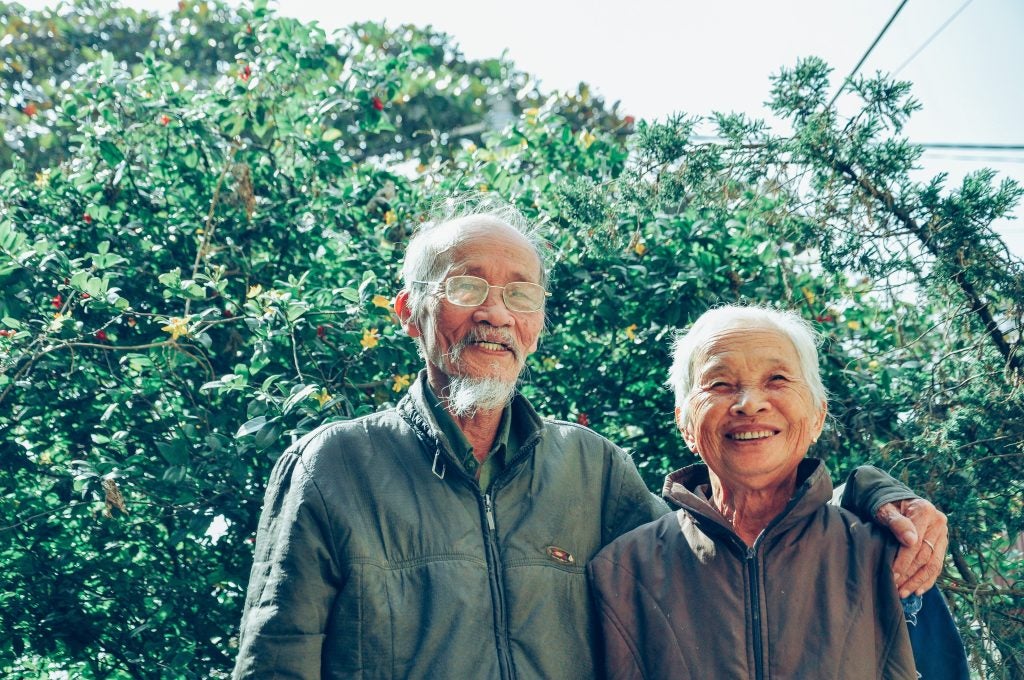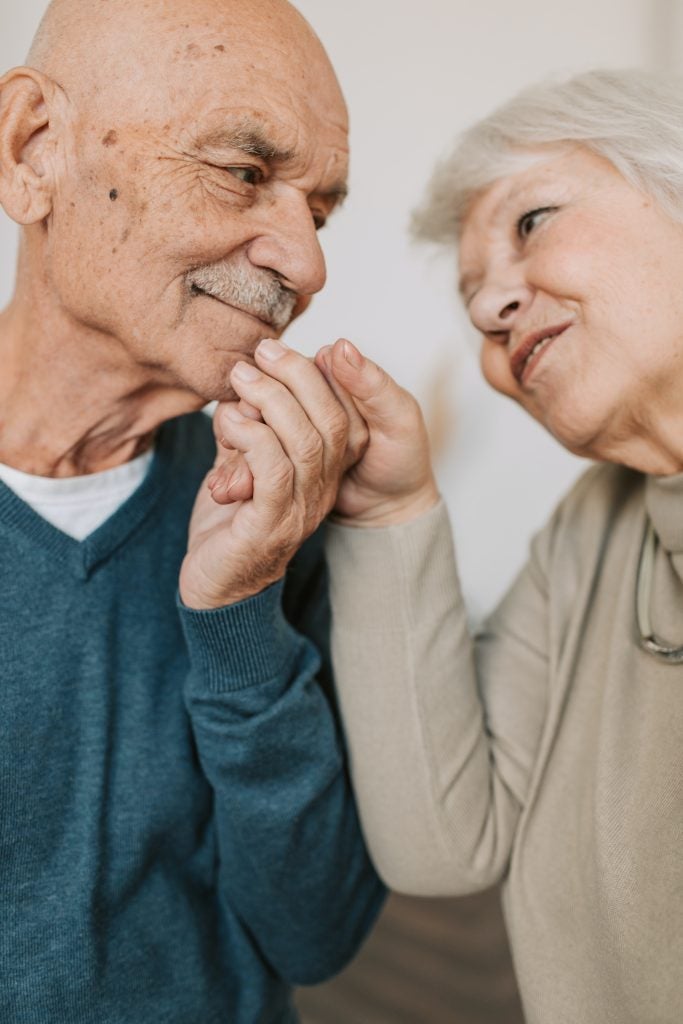
Although sex might not be as taboo as it used to be, the idea of sex as one gets older is still clouded with myths and uncertainty.
Society tends to hold the idea that older people simply do not participate in or enjoy sex as much as younger people. One study even showed that a significant amount of the elderly have pronounced their sex lives over at around age 50 or 60.1
However, many studies have shown that couples still enjoy engaging in sexual activities late into their seventies and eighties. It is very possible for the elderly to be sexually active and satisfied with their sex lives, no matter what age they are. Sex has many positive benefits and is said to increase happiness and even the length of one’s life. We hope to clear up some of the myths common about sexuality in old age.
These are some of the most common myths about aging and sex:
1. Older people do not need or want sex anymore.
For many people, it is hard and potentially uncomfortable to imagine their parents or even grandparents engaging in intimacy or sex. However, many studies have shown there to be a significant presence of sex drive, sexual activity and function in people older than 50. This works against the stereotype of an “asexual” old age and proves that many people do in fact engage in an active and regular sex life after the age of 50.1 Granted, a recent study showed that there are in fact some differences in sex among the elderly; these include a reduction in the quality of erection, amount of ejaculation, lubrication of the vagina and pleasure from orgasms.2 However, the study concluded that people are never too old to have a happy and healthy sex life.
2. Elderly people are not able to have sex, even if they did desire to.
Although, changes will occur in the male and female’s body as they age, but this does not mean that they cannot have sex. For example, even though a man’s erection may not be as hard as he enters into old age, a slower buildup time can allow for more foreplay time. A softer erection can also stimulate his partner and give his partner more time to reach orgasm. One problem with this myth is that men might expect to have the same erection that they did in their 20s, which is not realistic. More than one-third of men will have had some experience with erectile dysfunction by the time they are 40.3 Following this possible dysfunction, some men will be discouraged and have a succeeding fear of this event reoccurring. This fear and anxiety could lead to an evasion of sex. Anxiety also can cause difficulties obtaining or maintaining an erection, leading to even more stress and creating a negative feedback loop. This new stress factor is called “performance anxiety.” By reducing the feelings of performance anxiety, a man is more likely to overcome the erectile issues he may be experiencing. To help this situation, one can make an effort not to put sexual pressure on his or her partner and to keep communication open in a relationship.3

Bodily changes will also occur in older women, but this does not mean that they will no longer be able to engage in sex. One change that is common is a decrease in vaginal lubrication, which might deter couples from having sex. The lack of lubrication is due to a lesser amount of circulating estrogen after menopause. Sex might be difficult with less lubrication, and some couples have reported that sex is “no longer pleasant” after menopause. The bright side of menopause, however, is that women are free to explore sex without the possibility of pregnancy. There are many options, including lubricants, which women can use if sex is painful due to insufficient lubrication.4 One may also consider spending more time on foreplay since extending time of foreplay allows for the female to get more psychologically and physiologically aroused, thus creating more lubrication.
3. The elderly are too fragile and weak, so they can hurt themselves if they have sex.
It can be discouraging not to be able to have the same kind of sex that you may have had when you were younger; however, it is possible to have sex at all ages, regardless of health issues. Someone who might be considered “too fragile and weak” to have sex may just need to try out different sex positions to make it easier on their bodies.5 Some of the positions we recommend are the missionary position and doggy style. Depending on one’s health conditions, a man can try out different variations of a position, for example putting all his upper body weight on his arms instead of his partner’s body.6 There are many different sex position options for people depending on their health restraints that can still allow them to have great sex.
Remember that it is important for people engaging in sex to have a healthy heart. Though the risk is small, there have been cases in which the intensity of sex and orgasms are too much for weak hearts and have caused heart attacks.7 If you are questioning your sexual ability, we recommend that you see a doctor, who can do an examination of your heart and overall health. With proper treatment such as medication to lower blood pressure or prevent angina, most people will be able to withstand and enjoy sex even in their later years of life.7
4. Old couples do not have sex as much as studies say.
Again, this is not true. Countless studies have shown that people continue to have sex and enjoy sex throughout their life. A recent study proved that around 54% of men and 31% of women remain sexually active in their seventies.3 Sexual activity among elderly people can be associated with shame or guilt. This is rooted in society’s idea that people past a certain age should not engage in sexual interest or behavior. Society conveys a general idea that sex is for the young and the beautiful.1 Because of these negative messages from society, people may not be as willing to openly talk about their sexual activity. However, according to statistics, sex is still an important part of one’s life, no matter how they are.1
5. Sex is not as pleasurable when you are older.
This is also incorrect. Sex still has the potential of being pleasurable and even more enjoyable as one gets older. Around the age of 30 or 40, women reach a change in hormonal balance, which is accompanied by an increase in libido and sexual self-confidence.2 Around the age of 50, people are said to be on the brink of a more fulfilling sex life. Couples can mature emotionally together. Aging together as a couple can lead to an even deeper connection. One is able to grow with their partner and discover their own and their partner’s sexual likes and dislikes. This can lead to even more passionate and pleasurable sex.3

6. Older people are not as physically attractive and thus not desirable.
As couples enter their fifties and sixties, they still have the ability to feel sexy. Though arousal might need more tactile stimulation than before, both sexes can still be extremely desired by their partners at any age. Love and emotional attraction can contribute to sexual attraction and arousal. Furthermore, any experience that people have gained in their old age can give them confidence and assertiveness that they might not have had when they were younger.3
Sex has the potential to be enjoyable even as people grow old. Though there are common myths surrounding sex in old age that might bring up hesitations, it is still a very important part of one’s life, no matter what their age is!
References
- Taylor, Abi, & Gosney, Margot A. “Sexuality in older age: essential considerations for healthcare professionals.” Age and Ageing (2011): 1-6. Oxford University Press. Web.
- Kalra, Gurvinder, Alka Subramanyam, and Charles Pinto. “Sexuality: Desire, Activity and Intimacy in the Elderly.” Indian Journal of Psychiatry. Medknow Publications & Media Pvt Ltd, 2011.
- Rao, Dr. Sathyanarayana, Dr. Abhinav Tandon, and Dr. Keya Das. “Sexual Myths and Misconceptions.” Erotic Memoirs and Postfeminis011): 83-90. TotalSexSolutions.com. Department of Psychiatry, JSS Medical College and Hospital. Web.
- Ramakuela, N. J., T. Tshitangano, M. Maluleke, and N. K. Tugli. Menopause, Culture and Sex among Rural Women 2nd ser. 51.1 (2015): 220-25. Krepublishers.com. School of Health Sciences.
- “Sex in Elders: What to Expect with Sex and Aging.” Sex and Aging: What to Expect as You Grow Older. National Institute of Aging, 2013.
- “Rockstar Sex Positions for Older People.” The Health Site. N.p., 2014. Web.
- “Sex and Heart Disease.” Health Day. Health Day – News for Healthier Living. 2016.
Last Updated 13 Feb 2016.
